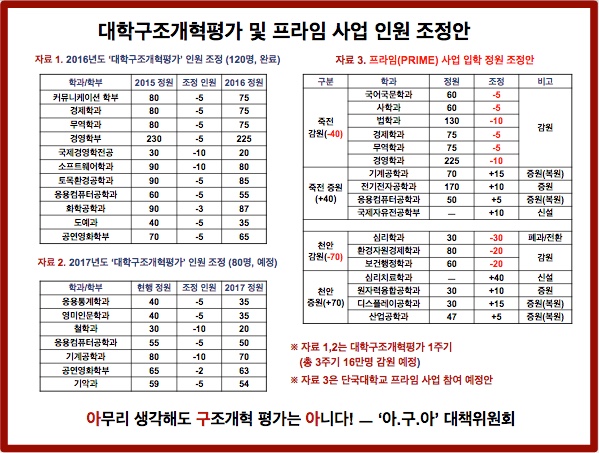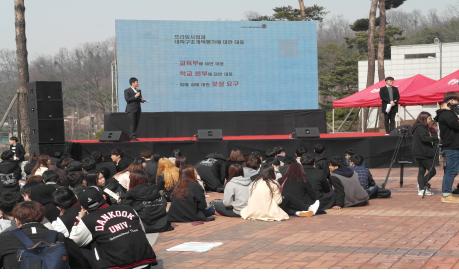Last January, Dankook University (DKU) decided to develop a proposal for the government’s PRIME project. If approved for participation, under the supervision of the Ministry of Education, DKU will undertake a large restructuring plan that will help the government reach projected industry employment shortages. DKU said they have received positive feedback from business on the program and their decision to participate and as a result, they will negotiate the layout of the necessary restructuring plan with students. The government and university both argued that the purpose of this project is to settle the mismatch between industry demand and available qualified workers as well as to increase the employment rate of youth.
Following the announcement of manpower forecasts, universities were encouraged to move student applicants from fields in humanities, social studies and arts to engineering and medical fields, because the number of graduates in the former fields exceeds the number of jobs available.
The project’s structural reform goal is to reduce the number of entrants in the field of humanities, social sciences and arts by three hundred thousand. Critics of the plan argue this program will increase in entrance examinations competition and educational costs per student. They also argue it will incite competition in an anti-educational way. In other words, the universities reform departments and adjust capacity according to social demand.
The main point raised by opponents to the plan is that the Ministry of Education is turning universities into employment academies. This is because many universities already fear low government assessment grades as it cuts into their allocated budgets. They see this as a method of recouping their recent financial support losses. Under the terms of the program, 9 selected universities with large scale projects will be selected to participate in PRIME and will qualify for additional funding of 5 to 30 billion won while 9 smaller scale applications will qualify for 5 billion. Therefore universities who are experiencing financial shortfalls are seeking to actively participate in PRIME.
 |
On January 15th, the student council was invited to discuss the university’s PRIME project proposal, but the discussions failed to achieve any concrete plan. They discussed the layoffs of 5 faculty members from the Department of Business Administration, the Department of Commerce and Trade and the Department of Economics and 20 staff members from each social science division and in the Department of Korean Language and Literature.
By participating in the PRIME project discussions, the number and distribution of layoffs between departments was altered. Instead, 5 members in each department (Dept. of Korean Language and Literature, social affairs division, Dept. of Economics and Dept. of Commerce and Trade) and 10 faculty members in two departments (Dept. of Law, Dept. of Business Administration) will be let go. In addition, 10 new jobs will be created in the fields of electrical and electronic engineering, and 5 new jobs in computer engineering. However, this isn’t yet, the final approved program.
DKU decided to draft their PRIME program proposal while maintaining on-going discussions with the student council. The Ministry of Education has yet to decide how many students should be reduced in the arts, humanities and social sciences fields, however, with the application due date set for the end of March, the university had to come to an agreement in order to put forward their restructuring plans on time.
The Dankook herald (DKH) interviewed the 2016 student council about PRIME. Kim Byeong-yeol answered our questions on behalf of the student organization. The DKH asked if PRIME will be beneficial for DKU students. He answered no and suggested instead that the plans will effectively kill our foundation studies programs and the concept of pure learning in favor of practical employment market based learning. He argued that the plan will destroy the true essence of a college education. The essence of the conflict is that on the one hand students will see their rights to study in fields of their choice impacted, while on the other hand, the university will see their funding increase anywhere from 5 to 30 billion won.
 |
| ▲ Student council is suggesting about PRIME project at 2016 studnet council general meeting. |
DKU is applying for a small scale PRIME project. If they are selected to participate, they could receive 5 billion won in support funding. As a result, the structural reform necessary for the university application has already begun. DKU keeps decreasing the total number of departments and furthermore, as a result of the 2016 university structural reform, they already decreased their student intake by 120. The purpose of applying for PRIME is to raise the level of our evaluation by the federal government. DKU officials believe that by participating in PRIME we can prove to the government we are adapting to the changing needs of society and that we are leaders and supporters of this changing society. Officials fear that if we don’t adapt to the new realities, we will suffer greater ramifications from the Ministry of Education.
The student council asserts several reasons for its desperate opposition to the project. First, they believe PRIME is destroying the essence of higher level learning and sacrificing the rights to open education for many students in exchange for addressing problems with the employment rate. Mr. Kim said, “The government is busy trying to shift the responsibility for job creation to the universities when it’s their job to figure out how to create employment.” Second, PRIME is a project the government is zealously pushing forward and it is destroying the autonomy of our university.”
The student council will keep pressuring DKU officials to reconsider the plans. However there is one group at DKU called AGUA that is vehemently opposed to the university structural reform and PRIME. They are raising awareness about the changes with Dankookians. They communicate through a group Facebook page and host regular information meetings, a propaganda campaign and other informative programs.
Mr. Kim said, “We need consistent discussions in dealing with DKU. We don’t have a specific plan to protect our faculties, however, we will fight and prepare a reaction for every proposal item we see.”
University education should not be designed solely for the purposes of filling in shortfalls in the employment markets. Many people want to learn for the sake of learning and they should have the right to make their own study choices. If universities and government target a joint purpose of increasing the employment rate, society as a whole will not benefit in the long run. Students need a chance for a brighter future and PRIME is not the road to achieving this objective.
윤정애, 오수연 dankookherald@gamil.com

![[Campus Magnifier] Let's Surf the Library!](/news/photo/202404/12496_1765_4143.jpg) [Campus Magnifier] Let's Surf the Library!
[Campus Magnifier] Let's Surf the Library!
![[Campus Magnifier] Let's Surf the Library!](/news/thumbnail/202404/12496_1765_4143_v150.jpg)





